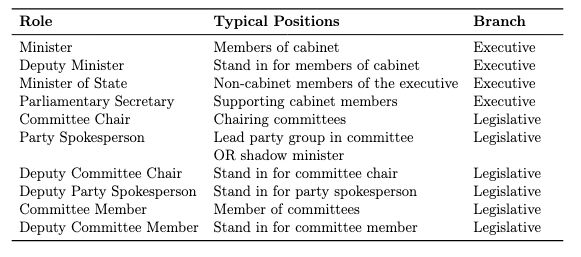
Jens Wäckerle
@jwaeckerle.bsky.social
Post-doctoral researcher at the Cologne Center for Comparative Politics (University of Cologne)
https://www.jenswaeckerle.com/
https://www.jenswaeckerle.com/
These nuanced perceptions hold interesting potential for parties when they try to persuade citizens of a minority government. Stay tuned for more insights on political representation under minority governments from our #MINORITYRULE project!
October 17, 2025 at 12:44 PM
These nuanced perceptions hold interesting potential for parties when they try to persuade citizens of a minority government. Stay tuned for more insights on political representation under minority governments from our #MINORITYRULE project!
Despite low knowledge levels and general opposition towards minority governments, citizens believe them to work better with the opposition and listen to the demands of all voters. Meanwhile, they see min. governments as less stable, less able to solve conflicts, less legitimate and less reliable.

October 17, 2025 at 12:44 PM
Despite low knowledge levels and general opposition towards minority governments, citizens believe them to work better with the opposition and listen to the demands of all voters. Meanwhile, they see min. governments as less stable, less able to solve conflicts, less legitimate and less reliable.
Next, we find that citizens dislike minority governments in all countries. In Sweden, only 10% of respondents like them! Especially older voters and government supporters dislike them. Knowledge about minority governments increases opposition towards them.

October 17, 2025 at 12:44 PM
Next, we find that citizens dislike minority governments in all countries. In Sweden, only 10% of respondents like them! Especially older voters and government supporters dislike them. Knowledge about minority governments increases opposition towards them.
More likely to answer correctly? Citizens with ⬆️ education, ⬆️ political interest, older voters, and men (although for men likely due to guessing). Small country differences. Most common mistakes: Minority governments defined by getting less than half of votes or by exclusion of the largest party.

October 17, 2025 at 12:44 PM
More likely to answer correctly? Citizens with ⬆️ education, ⬆️ political interest, older voters, and men (although for men likely due to guessing). Small country differences. Most common mistakes: Minority governments defined by getting less than half of votes or by exclusion of the largest party.
Our survey shows that about 1 in 4 citizens can correctly define a minority government (excluding lucky guesses). This is about the same as the share of people that can correctly define the roles of all parties in parliament.

October 17, 2025 at 12:44 PM
Our survey shows that about 1 in 4 citizens can correctly define a minority government (excluding lucky guesses). This is about the same as the share of people that can correctly define the roles of all parties in parliament.
The German data is not great, I collected it from the member's pages of the individual MPs. Once you have all those in a list (which MP was in which committee per term), combining it with the existing dataset is straightforward (just need to check and jnify names and code policy areas).
October 8, 2025 at 5:04 PM
The German data is not great, I collected it from the member's pages of the individual MPs. Once you have all those in a list (which MP was in which committee per term), combining it with the existing dataset is straightforward (just need to check and jnify names and code policy areas).
This dataset truly was a monumental team effort, it took more than three years to put together. Thanks to everyone who contributed and gave feedback along the way. If you find any errors or have ideas for extensions, please contact us!
October 8, 2025 at 12:58 PM
This dataset truly was a monumental team effort, it took more than three years to put together. Thanks to everyone who contributed and gave feedback along the way. If you find any errors or have ideas for extensions, please contact us!
As a first application, we show that women across all countries are much more likely to be assigned to low and medium prestige committees (coding from WhoGov by @jacobnyrup) and as members rather than leadership. We are excited to see the many ways other people will use this data!

October 8, 2025 at 12:58 PM
As a first application, we show that women across all countries are much more likely to be assigned to low and medium prestige committees (coding from WhoGov by @jacobnyrup) and as members rather than leadership. We are excited to see the many ways other people will use this data!
Each position is assigned a role according to the table below. Committee members are by far the most common, but there are other types. We also collect executive positions.

October 8, 2025 at 12:58 PM
Each position is assigned a role according to the table below. Committee members are by far the most common, but there are other types. We also collect executive positions.
The dataset covers European countries plus New Zealand and the US from 1989 to 2024. Overall, there are over 130,000 positions! Each entry is one MP’s position for one party within one legislative term.

October 8, 2025 at 12:58 PM
The dataset covers European countries plus New Zealand and the US from 1989 to 2024. Overall, there are over 130,000 positions! Each entry is one MP’s position for one party within one legislative term.
Reposted by Jens Wäckerle
The current consensus in political science is that Nazis hating me and me hating Nazis are both equal parts of the ~polarization problem
September 18, 2025 at 3:12 PM
The current consensus in political science is that Nazis hating me and me hating Nazis are both equal parts of the ~polarization problem
Give Tadej Pogacar French citizenship and we'll avoid the runoff!
September 17, 2025 at 9:13 AM
Give Tadej Pogacar French citizenship and we'll avoid the runoff!
The "somewhat" is just perfect. How many placebo Europes matter more?? HOW MANY?!
August 15, 2025 at 10:29 AM
The "somewhat" is just perfect. How many placebo Europes matter more?? HOW MANY?!
The end. Shout out to Nyunyu wholesale dongdaemun for an excellent collection.
July 13, 2025 at 7:53 AM
The end. Shout out to Nyunyu wholesale dongdaemun for an excellent collection.
10. Political theory

July 13, 2025 at 7:53 AM
10. Political theory
9. Climate politics

July 13, 2025 at 7:53 AM
9. Climate politics
8. Political behaviour

July 13, 2025 at 7:53 AM
8. Political behaviour
7. Social democracy in crisis

July 13, 2025 at 7:53 AM
7. Social democracy in crisis

